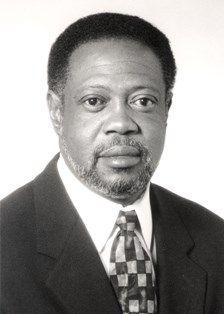Minorities in the Senate
Current Senators
Former Senators
 Senator Joyce Elliott
Senator Joyce Elliott
Arkansas Senate: 2009–2022 (Photo Gallery)
Senator Joyce Elliott represented Little Rock in the Arkansas legislature for 20 years, 14 of them in the Senate and six in the House of Representatives.
For 30 years Elliott taught high school juniors and seniors Advanced Placement and standard courses. She has taught in Florida, Minnesota and Texas.
In 2004 Senator Elliott left the classroom and began working for the College Board, focusing on expanding access to AP classes for students currently underrepresented: African-American, Latino, rural and low-income students.
Senator Elliott was born in Willisville, where she graduated from high school. She earned an undergraduate degree in English and speech from Southern Arkansas University in Magnolia in 1973 and a graduate degree in English from Ouachita Baptist University in Arkadelphia in 1981.
As a legislator, Senator Elliott has been vice chair of the Senate Education Committee, a member of the Insurance and Commerce Committee, the Joint Committee on Retirement and Social Security Systems, the Legislative Council, the Joint Auditing Committee and the Joint Budget Committee.
Senator Elliott has been active with the Democratic Party at the local, state and national level, having served as first vice chairman of the Democratic Party of Arkansas, a member of the Democratic National Committee (DNC) and its Resolution Committee. Twice she ran for Congress from the Second District of central Arkansas.
 Senator Jack Crumbly
Senator Jack Crumbly
Arkansas Senate: 2007–2012 (Photo Gallery)
Senator Jack Crumbly represented District 16 of eastern Arkansas for six years, from 2007 through 2012.
He became chairman of the Senate Committee on Insurance and Commerce, vice chairman of the Joint Performance Review Committee and vice chairman of the Senate Interim Committee on Children and Youth. He also served on the Public Health, Welfare and Labor Committee.
A native of Widener, in St. Francis County, he and his wife Johnetta have two daughters and a son.
Before his election to the Senate, he served 12 years on the St. Francis County Quorum Court. He was superintendent of the Earle School District, and after he left the Senate he established a regional alternative school.
His legislative agenda every session included economic development, improved access to health care, public education, assistance for the elderly, financial aid to UAPB and other learning institutions in the Delta, and constituent service.
“In the end, one of the things I was most inspired by is the resiliency of the great number of people who work in the trenches every day to help others,” he said.
He also was appointed to the Arkansas Minority Health Commission.
Senator Crumbly earned a degree from the University of Arkansas at Pine Bluff with a double major in agriculture and biology. He earned a master’s degree from the University of Arkansas at Fayetteville.
Senator Crumbly was involved in a historic Senate hearing, after his re-election in 2006. He had defeated then Representative Arnell Willis of West Helena, who claimed that the votes were not accurately counted.
More than 9,400 voters were cast and the margin of victory was 68 votes, according to the final certified results maintained by the Secretary of State.
After lengthy hearings on the disputed election, the entire Senate voted to seat Senator Crumbly.
The Senate had to create procedures for gathering evidence and determining the validity of evidence. Also, the Senate had to create a procedure for swearing in and hearing witnesses, and then allowing attorneys for each side to question them.
The result was a hearing process with some similarities to both a courtroom trial and a legislative committee meeting.
Senators were aware that their ruling will have significance beyond deciding who would represent District 16. It established precedence, in the event that future elections should be disputed.
Even though the case began in the court system, it was promptly referred to the Senate. Judges have consistently ruled that it is the constitutional duty of legislative bodies to determine the qualifications of their own members, and who should be seated.
 Senator Irma Hunter Brown
Senator Irma Hunter Brown
Arkansas Senate: 2003-2008 (Photo Gallery)
Senator Brown of Little Rock was the first African-American woman elected to the Arkansas House of Representatives and served from 1980 to 1998. She then became the first African-American woman to serve in the history of the Arkansas Senate, after she was elected in 2002. She served in the Senate for six years, and became chair of the Senate Committee on City, County and Local Affairs.
A native of Tampa, Florida, she was a member of the African Methodist Episcopal Church. She and her husband, Dr. Roosevelt Brown, raised two children.
She attended Shorter Junior College and graduated magna cum laude from the former Arkansas AM&N University, which is now the University of Arkansas at Pine Bluff. She attended Memphis State University and the former D.C. Teachers College, which later became Federal State University in Washington, D.C.
She was a teacher in Memphis and Washington, D.C. and then director of nutrition education in Little Rock. She worked for the Education Department and was president of Shorter College from 1998 to 2001.
Senator Brown was a member of the NAACP and the North Little Rock Rotary Club.
During her career, she received the ACLU Humanitarian of the Year Award. She belongs to the Alpha Kappa Alpha sorority, and received an Honorary Doctorate from Shorter Junior College, and Fellow at the Institute of Politics at Hendrix College in Conway.
 Senator Tracy Steele
Senator Tracy Steele
Arkansas Senate: 2003-2008 (Photo Gallery)
Senator Tracy Steele represented North Little Rock and Little Rock in the Arkansas legislature for 14 years, from 1999 through 2012. He served in the Senate for eight years and the House of Representatives for six years.
He is a member of the North Little Rock School Board. He and his wife, Cassandra, have a daughter and a son.
He was chairman of the House Committee on Public Health Welfare and Labor, vice chairman of the Senate Committee on Public Health, Welfare and Labor, chairman of the Children and Youth Committee and vice chairman of the Joint Performance Review Committee.
Senator Steele was Senate Majority Whip during the 85th General Assembly and Senate Majority Leader during the 86th General Assembly. He is a past president of the Legislative Black Caucus.
Currently he is director of the Arkansas Health Services Permit Agency. Previously, he was CEO of the Stand Foundation, a non-profit that provides leadership training for young adults. It is an acronym for "Strive Toward a New Direction."
Senator Steele is a former executive director of the Martin Luther King Commission, and a former special assistant to Governor Jim Guy Tucker.
Senator Steele sponsored legislation to create the statewide trauma system, and to fund it with revenue from a tax on cigarettes. He sponsored the law that requires high schools to have an automated external defibrillators available at major school activities.
In 2008, the date of the state primary election was moved up to February so that Arkansas would have a more influential voice in the nominating of presidential candidates. The earlier primary date in presidential election years has since become permanent.
Other legislation sponsored by Senator Steele includes a law to streamline access to unemployment benefits and a ban on the sale of toy guns that are replicas of real guns. He sponsored legislation to provide more than $200,000 in scholarship support for Historically Black Colleges and Universities.
A longtime public health advocate, Senator Steele sponsored the 2006 Arkansas Clean Indoor Air Act to protect workers and citizens from secondhand smoke in the workplace and public places. He is proud to have supported legislation to complete the monument on the state Capitol grounds dedicated to the Little Rock Nine and the civil rights movement.
In 2005, Senator Steele did what few elected officials would have the nerve to attempt. The Razorback basketball team of the University of Arkansas scheduled a game at the arena in downtown North Little Rock, in the heart of Steele's Senate district. Their opponents were the Owls of Rice University, where Steele earned his political science degree, and where he had played NCAA basketball.
Razorback fans filled the arena and were surprised to see Steele cheering openly, and loudly, for the opposing team! And he was sitting in the best seat in the house, at mid-court, right on the floor, where everyone could see him.
Their response was telling. The Razorback faithful accepted Steele, out of respect for his having the courage to show loyalty to his alma mater when it would have been easier for him to sit quietly or try to straddle the fence.
Few politicians would ever place themselves in such a vulnerable position, where the hometown fans might boo you in front of television cameras. Steele never gave it a thought because, as he said at the time, his priority was to show loyalty where it was due and to have some fun. His priorities were contagious that day, when even rabid basketball fans were reminded it was just a game.
Senator Steele has received numerous awards and honors, many of them in recognition of his work to improve public health and to enhance opportunities for youth.
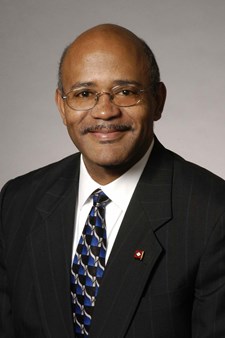 Senator Henry “Hank” Wilkins, IV
Senator Henry “Hank” Wilkins, IV
Arkansas Senate: 2001-2004 (Photo Gallery)
Senator Henry “Hank” Wilkins, IV, represented Pine Bluff and southeast Arkansas for 16 years, from 1999 through 2014.
He first served in the House of Representatives for one term, in 1999 and 2000, then in the Senate from 2001 through 2010. He was elected again to the House and served from 2011 through 2014.
After he left the legislature, he was elected County Judge of Jefferson County.
He was a pastor at Saint James United Methodist Church and the Pine Bluff Instructor for the Perkins School of Theology Course of Study at Southern Methodist University in Dallas.
Senator Wilkins graduated from Pine Bluff public schools, then earned a bachelor’s degree from the University of Michigan at Ann Arbor. He attended University of Arkansas School of Law at Fayetteville and earned his Master of Divinity from Saint Paul School of Theology in Kansas City, Missouri.
He was honored with a Doctor of Humane Letters from Philander Smith College in Little Rock.
He and his wife, Phyllis, have two sons.
He became Senate co-chair of the Legislative Council and vice chair of the Senate Committee on Insurance and Commerce. Earlier in his Senate career he was chair the Senate Committee on Public Transportation. He also Senate co-chair of the Legislative Auditing Committee and chair of the Senate Technology and Legislative Affairs Committee. He also served a term as chair of the Arkansas Legislative Black Caucus.
As a member of the Senate Education Committee, he helped craft the state’s response to the Lake View school funding lawsuit, which resulted in far-reaching improvements to public education after the state Supreme Court ruled that the existing funding formula failed Arkansas schools.
He also sponsored legislation to prevent racial profiling by law enforcement agencies, and to develop policies to people and police officers more aware of the extent of racial profiling.
Legislation he sponsored required Division of Youth Services officials to appear before the General Assembly in order to make any changes in contracts with providers.
His mother, Josetta Wilkins, and father, Henry Wilkins III, both represented Pine Bluff in the Arkansas House of Representatives. His uncle was Senator Jean Edwards of Sherrill, who represented Pine Bluff and southeast Arkansas in the Senate for 10 years.
Outside of government, his contributions to civic organizations include membership in the Southern Christian Leadership Conference, in which he is a Dallas Chapter Past-President. He was Secretary of the National Black Methodists and has served as PTA President for three different public schools.
 Senator Alvin Simes
Senator Alvin Simes
Arkansas Senate: 2001-2002 (Photo Gallery)
Senator Alvin Simes of Forrest City represented District 22 in eastern Arkansas for two years, 2001 and 2002.
A native of West Helena, he is an attorney who earned his bachelor’s of science degree from Arkansas State University and his law degree from the University of Arkansas.
During the 83rd General Assembly, he chaired the Senate Committee on Public Transportation and served on the Senate Committee on City, County and Local Affairs.
Senator Simes co-sponsored legislation to establish Daisy Gatson Bates Day as an official state holiday, which became law when Act 304 of 2001 took effect.
He also co-sponsored Act 1785 to create a Fair Housing Commission and Act 1176 to create the Mosaic Templars of America Center for African-American Culture and Business Enterprise.
Senator Simes sponsored legislation to help needy Arkansans pay funeral costs, and to fund public port infrastructure improvements.
Prior to his election to the Senate he served as a City Attorney and a County Attorney. He is a member of Kappa Alpha Psi, the Delta Theta Phi Law Fraternity and the Arkansas Trial Lawyers Association.

Senator William L. "Bill" Walker, Jr.
Arkansas Senate: 1995-2002 (Photo Gallery)
Senator Bill Walker represented Little Rock in the state Senate for eight years, from 1995 through 2002, when provisions of the constitutional term limits amendment required him to step down.
He was a member of the House of Representatives for eight years, from 1987 through 1994, when he was elected to the Senate. Before his election to the House he was a member of the Pulaski County Quorum Court.
Senator Walker represented District 17, which was predominately African-American and completely urban. The community he represented faced issues similar to those found in Oakland, California, or the South Central neighborhood of Los Angeles.
In 1993 he was the lead sponsor of the first Civil Rights bill enacted in Arkansas. This landmark piece of legislation allowed civil rights actions to be filed in state courts, making justice more accessible to people who don’t live conveniently near a federal court.
Senator Walker was co-sponsor of the Arkansas Better Chance program, which expanded pre-school. With other Pulaski County lawmakers he successfully pushed through legislation preventing new landfills from concentrating in low-income neighborhoods.
His list of legislation reflects his priorities: to make low interest loans available to minority teachers who continue their studies, to test infants for sickle cell anemia, to prohibit the sale of tobacco products to minors, to strengthen job security for teachers, to make the health care system for accessible for people with low incomes and to enhance minimum prison sentences for the worst criminal offenders.
Upon his election to the Senate he quickly assumed a place among leadership, becoming a member of the Joint Budget Committee and chairman of the Public Health Welfare and Labor Committee.
After leaving the Senate he became director of the Arkansas Career Education Department, then president of Premier Funeral Homes of Little Rock and president at Power Group Enterprises.
His father, William “Sonny” Walker, was a pioneer in the civil rights movement.
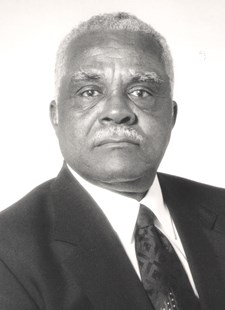 Senator Jean C. Edwards
Senator Jean C. Edwards
Arkansas Senate: 1991-2000 (Photo Gallery)
Senator Jean Edwards represented parts of Pine Bluff and southeastern Arkansas for 10 years. Previously, he had been a member of the Jefferson County Quorum Court for 12 years.
He was born in North Little Rock in 1929 and when he was five, his family moved to the Pastoria Community near Sherrill, which became his lifelong residence.
He found Christ at a young age at the Damascus Missionary Baptist Church in Pine Bluff, and soon afterward joined the New Hope A.M.E. Church, where he was a steadfast member until his death in 2017. He was Sunday School Superintendent for 50 years and began the church’s annual Christmas Program in 1954.
He attended public schools in Pastoria, New Hope and Sherrill, but junior high was the highest level available to African-American children at the time. His parents bought a home in Pine Bluff so their children could continue their education there, and Senator Edwards graduated from Merrill High School of Pine Bluff.
“Back in those days I was the only black boy in Sherrill that had a high school diploma,” he said. “I didn’t see the value of education at that time. We were farming and I thought we were doing pretty good. Of course we were poor, but I didn’t know it.”
He enlisted in the Air Force and after his honorable discharge in 1954 he met Artemeze Redwood, the love of his life. They married and enrolled at Arkansas AM&N College, which is now the University of Arkansas at Pine Bluff, where he earned a bachelor’s of science degree in agriculture. Later in life he studied at the University of Arkansas and the University of Central Arkansas.
They had two sons and two daughters, and at the time of his death they had 10 grandchildren and 10 great-grandchildren.
Besides farming, Senator Edwards was a teacher and principal in Sherrill, Tucker and Wabbaseka. He was involved in the NAACP, LeadAR, local volunteer fire departments and Boys and Girls State. He served on the boards of Jenkins Memorial Center, the state Literacy Council, the Black History Task Force, the Arkansas Minority Health Commission, the State Fair Board of Directors, the Jefferson County Industrial Foundation, the Advisory Committee of the UAPB Agriculture Department, the UAMS Family Practitioners’ Advisory Board, among many other boards and commissions.
In the Arkansas legislature, he became chairman of the Senate Committee on City, County and Local Affairs and was a member of the Senate Revenue and Taxation Committee, the Joint Budget Committee and the Public Health, Welfare and Labor Committee. He served on the Sentencing Task Force, the Civil Rights Task Force and the State Building Services Commission.
Senator Edwards represented 13 school districts, UAPB and Southeast Technical College in Pine Bluff. He was a staunch advocate for education, and worked to alleviate the financial impact of declining enrollment in isolated rural schools. He sponsored appropriations for facilities and research at UAPB. He appreciated the importance of highways and transportation in economic development. As a farmer, he understood the long-term benefits of funding irrigation and water systems, to prevent the depletion of ground water and to maintain the availability of clean surface water.
Senator Edwards’ father was a farmer, and with his brother Jasper, he always found time to farm although he maintained a busy schedule of public service. “The most important characteristics of a farmer are faith and patience,” he liked to say.
In 1991 he and his sister, Josetta Wilkins, made Arkansas history. They became the first brother and sister to serve simultaneously in the General Assembly, when she replaced her late husband, Henry Wilkins, III, as a representative in the House.
The Pine Bluff Commercial endorsed him during his first race for the Senate, in 1990, and its editorial board wrote that voting for Jean Edwards was an easy choice because he embodied “the best qualities of the Delta: courtesy, kindness, diligence, patience, a sense of family, and a sense of community.”
Senator Jean Edwards lived his life knowing that he was loved by God. Speaking of Artemeze, his family, and his opportunities to learn and to contribute to his community, he said that “I have been blessed beyond measure.”
Senator Roy C. Lewellen
Arkansas Senate: 1991-2000
Senator Roy C. “Bill” Lewellen of Marianna represented eastern Arkansas for 10 years, from 1991 through 2000.
He served on the Senate Insurance and Commerce Committee and the Senate Judiciary Committee, was Senate co-chair of the Joint Legislative Facilities Committee, vice chair of the Senate Rules Committee and a member of the Joint Budget Committee and the Joint Performance Review Committee.
Before his election to the Senate, he had served on the Marianna City Council.
He is an attorney, and was one of the plaintiffs’ lawyers in the landmark school funding case filed in 1992 by the Lake View School District, a rural isolated district in Phillips County.
After years of litigation the state Supreme Court ruled in favor of Lake View, citing the state’s constitutional duty to provide all Arkansas children with an adequate and equitable education, regardless of the prosperity or poverty of the region in which they lived.
The case was the catalyst for substantial improvements in public schools across Arkansas. The legacy of Lake View still prevails today in the Arkansas legislature, which conducts an adequacy study of the needs of public education before every regular session.
The legislature significantly increased funding of schools, for both ongoing operations and to improve facilities. During a lengthy special session in 2003 and 2004, the legislature enacted stronger accountability measures for school officials, as well as higher education standards.
Senator Lewellen was elected to the Senate on his second attempt. In the late 1980s, before and during his first unsuccessful campaign, Lewellen confronted the prevailing white power structure in Lee County. He was prosecuted for allegedly bribing witnesses, but Lewellen believed the charges were filed because he had run against a long-standing incumbent senator. He responded by filing suit in federal court.
In an extremely rare decision in which the federal courts intervene in local police matters, U.S. District Judge George Howard, Jr. ordered a stop to the prosecution of Lewellen.
Judge Howard said charges against Lewellen were in bad faith and had been filed by prosecutors with no expectation of a valid conviction. Howard said that the criminal charges were filed against Lewellen in retaliation for exercising his constitutional rights.
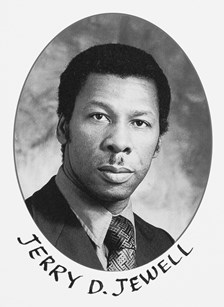 Senator Jerry D. Jewell
Senator Jerry D. Jewell
Arkansas Senate: 1973-1994 (Photo Gallery)
Senator Jerry Jewell was born on September 16, 1930 in Chatfield, which is located in Crittenden County, Arkansas.
He was the first African-American to serve in the Arkansas Senate in 80 years. The last African American to serve in the Arkansas Senate was Senator George Bell who served until 1894.
Senator Jewell served in the Arkansas Senate from 1973 to 1994. Senator Jewell’s peers in 1993 elected him to be the Senate President Pro-Tempore.
On Sunday, January 17, 1993 at 7:00 am until Wednesday, January 21st at 4:00 pm Senator Jewell served as acting-governor of the state of Arkansas. Governor Tucker was in Washington, D.C. for President Clinton’s inauguration and the state had not elected a new lieutenant governor yet. Therefore, the duties of governor fell on the Senate President Pro-Tempore, Senator Jewell. He was and still today is the only African-American to serve in the roll of acting-governor even through it was for only four days.
Senator Jewell was a dentist and held serveral positions in the NAACP (National Association for the Advancement of Colored People).
Senator Jewell died on August 17, 2002 and his body lay in state at the state captiol. He is buried at the Veterans Cemetery in North Little Rock, Arkansas.
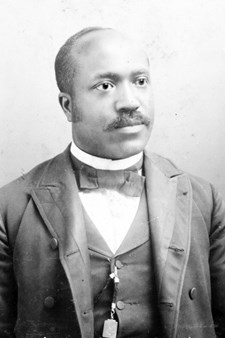 Senator George W. Bell
Senator George W. Bell
Arkansas Senate: 1891-1894
Senator George W. Bell was the only African-American serving in the 1891 and 1893 Arkansas Senate. He respresented the 17th District that consisted of Desha and Chicot counties. He was also the last African-Amercian to serve in the Arkansas Senate until 1973 when Senator Jerry D. Jewell was elected.
Many historians believe that Senator Bell was a former slave.
Senator Bell graduated from Lincoln University in Pennsylvania. He worked as a teacher, doctor, travel agent, insurance agent, and professor and President of Southland College near Helena, Arkansas.
Senator Bell led the movement against the Tillman Bill, which provided for segregation of railroad and trolley cars. There are few records, but Senator Bell died sometime after 1927.
Senator W. H. Logan
Arkansas Senate: 1889-1890
Senator W. H. Logan was born in Ohio between 1850 and 1855. He served only one term in the senate during the 27th General Assembly (1889 – 1890.) Logan represented Arkansas Senate District 15 which included parts of Chicot and Desha counties.
He introduced three bills, but only one was signed into law. Senate Bill 91 was an act to provide for the building and repair of levees in Chicot County and was signed by Governor James Eagle. Senate Bill 127 which passed the Senate Education Committee, but failed on the Senate floor would provide for the appointments, and to define the duties of District (School) Examiners. Senate Bill 188 failed in the Senate Railroad Committee would give “relief of railroad companies in the State of Arkansas.”
Senator Logan was a Justice of the Peace, a preacher, teacher and a farmer. Historians have stated that there are no known records for when Senator Logan died.
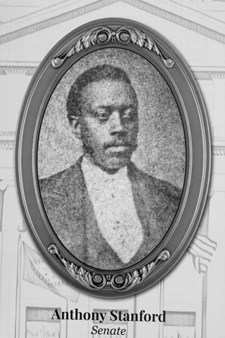 Senator Anthony Stanford
Senator Anthony Stanford
Arkansas Senate: 1877-1880
Anthony Stanford was born in New Jersey in 1830. Since he was born in the northern states he was a free man his whole life.
Stanford was elected to the 14th District of the Arkansas Senate and served in the 21st General Assembly (1877) and the 22nd General Assembly (1879.) The 14th District included parts of Lee and Phillips counties.
In 1877, he ran as a Republican and in 1879 he changed parties and ran on the Greenback ticket. In 1877, Senator Stanford served on the Senate Committee on Elections and Penitentiary. In 1879, Senator Stanford served on the Senate Committees for Education and Franchise.
Senator Stanford was ordained in the African Methodist Episcopal (AME) Church and he received his medical degree from Eclectic Medical College of Philadelphia.
He passed away in 1883.
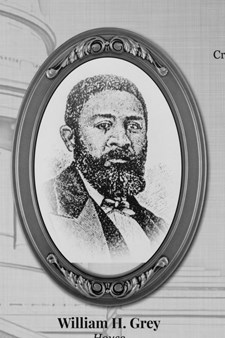 William H. Grey
William H. Grey
Arkansas Senate: 1875 (Special Election)
William H. Grey was born December 22, 1829 in Washington, D.C. There is evidence that his father was Henry A. Wise; a white congressman and governor of Virginia (1856-1860). Henry A. Wise only freed three slaves during his life: William H. Grey, his mother and his sister. Also, there are reports that Congressman Wise brought young Grey to the U.S. House of Representatives where he folded documents and heard speeches at Wise’s desk inside the Chamber.
Grey married Henrietta Winslow of Cinncinnati, Ohio and they had nine children. He was also a Methodist minister.
In 1863, he arrived in Helena, Arkansas and opened up a grocery and bakery store and quickly became active in Republican state politics. After serving as a member of the 1868 state constitutional convention he ran and won a seat in the state House of Representatives.
He was known for his articulate speeches. In 1875 he won a special election for a seat in the Arkansas Senate due to the passing of Senator John Willis Williams. Senator Grey took the oath of office on Tuesday, November 2, 1875.
He passed away in November of 1888 leaving his wife to take care of several children that were still living at home.
Senator Samuel Holland
Arkansas Senate: 1873, 1874 (Special Session)
There is little historic information available about Senator Samuel H. Holland. He was born around 1844 in Ohio and no records can be found of his death. Senator Holland represented Ashley, Chicot, Drew, and Desha Counties.
From the Arkansas Senate Journals for 1873, Senator Holland introduced three bills. One of the bills died in the Senate Education Committee. This bill was title was “An act to amend an act entitled ‘An act to establish and maintain a system of free common schools for the state of Arkansas;’ also to amend ‘ An act for the better regulation of public school in cities and towns.’’
Another bill that he introduced in the Senate, which died on the floor in House of Representatives was called “An act to prevent the issuance or negotiation of fraudulent or spurious warehouse receipts.”
Senator Holland did get one of his bills signed by the Governor and it was an act to amend the code of practice in civil cases.
Senator Richard A. Dawson
Arkansas Senate: 1873, 1874 (Special Session)
Senator Richard A. Dawson was born in 1848 in Virginia. The son of a minister, he obtained his education at Oberlin College, Ohio. He was one of two Black men admitted to the Law Department of the University of Chicago in 1869, and the second Black man admitted to practice in Illinois in 1870.
By December 1870, he had moved to Pine Bluff to practice law. At the age of 25 years old, he served one term in the Arkansas Senate in 1873 (19th General Assembly) and a Special Session in 1874 representing Jefferson County .
Senator Dawson served with three other African-American men, Senator James T. White, Senator Ruben B. White and Senator Samuel Holland in the Arkansas Senate. In 1879, he was elected to the House of Representatives for one term.
By 1896, Dawson moved back to Chicago where he remained active in politics. He passed away in 1906 and was laid to rest in the Union Ridge Cemetery in Chicago, Illinois.
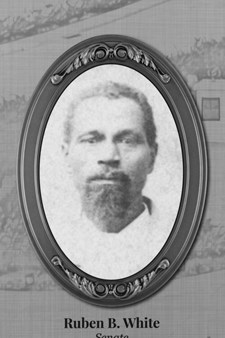 Senator Ruben B. White
Senator Ruben B. White
Arkansas Senate: 1873,1874 (Special Session)
Senator Ruben B. White served with his brother, Senator James T. White, in 1873 in the 19th General Assembly. Senator White served Arkansas Senate District 10 which covered Pulaski and White counties , the counties were next to each other in 1873.
He was a pastor of a church in Little Rock and had lived in Arkansas for three years before he was elected to the Arkansas Senate. He served with three other African-American men in the Arkansas Senate that same year: his brother, Senator James T. White, Senator Samuel Holland and Senator Richard Dawson.
According to the Senate Journal, Senator White served on the Education, Bank and Memorial Senate Committees. He proposed an act that would prohibit the appointments of constables and bailiffs.
There is no record of Senator White’s death.
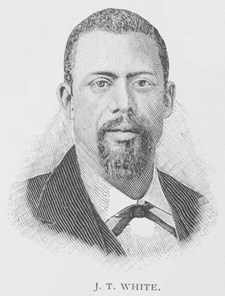 Senator James T. White
Senator James T. White
Arkansas Senate: 1871-1873
Arkansas Convention: 1868,1874
Senator James T. White was born on August 25, 1837 in New Providence, Indiana. On August 21, 1865 he became the pastor of the Second Baptist Church in Helena, Arkansas.
In the fall of 1868, while supporting Reconstruction efforts he was elected to the state Constitutional Convention with seven other African-American men. After serving the Helena area for the Constitution Convention he was elected to the Arkansas House of Representatives in 1869 (17th General Assembly.) He was re-elected to the House twice and then served one term in the Arkansas Senate.
In 1871 (18th General Assembly) Senator White served with Senator James W. Mason who was the first African-American to serve in the Arkansas Senate. In 1873 (19th General Assembly) Senator White served with three other African-American men and one of those men was his brother from Pulaski County, Senator Ruben B. White. In 1874 he was elected to a second convention for the writing of a new constitution, the one we still use today.
White resigned from the Second Baptist Church in 1891 and passed away a year later of pneumonia in Helena, Arkansas.
 Senator James W. Mason
Senator James W. Mason
Arkansas Senate: 1869-1872
Arkansas Convention: 1868
Senator James W. Mason was born in 1841 in Chicot County, Arkansas. In 1868, he served as a delegate in the Arkansas Constitutional Convention. He was then elected to two terms in the Arkansas Senate in 1869 (17th General Assembly) and again in 1871 (18th General Assembly).
Senator Mason was the first African-American to serve in the Arkansas Senate. His father was Elisha Worthington, a prominent landowner and the largest slave owner of Chicot County. Mason’s mother, whose name is unknown, was one of Worthington’s slaves. His father sent James and his sister, Martha, to Oberlin College in Ohio, one of the first colleges in the United States to admit African-American students between 1855-1858. He went on to study at the prestigious St. Cyr Military Academy in France.
During the Civil War his father placed him in charge of Sunnyside, his largest plantation. Just prior to serving in the Arkansas Senate he was appointed postmaster of Sunnyside, AR in 1867. He was the first known African-American postmaster in the United States (1867-1871). His appointment would have coincided during his senate terms.
He also served as a probate judge and as county sheriff in Chicot County. Senator Mason died in 1874.




